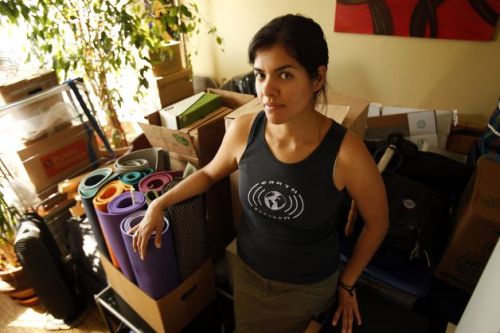May

City employees say they can’t afford to live in S.F. | SF Gate
Claudia Flores has had to move twice since October when landlords nearly doubled her rent in San Francisco. Now she’s crashing with friends and trusting a space will open up in another friend’s apartment next month.
If she earned more, Flores says she could have been able to stay in a smaller room at the Mission District condo she shared. Instead, the whole place was rented to “two guys in their 20s who work for Apple.”
Flores is not a twentysomething fresh out of college making a go of it in the big city. She’s a 36-year-old professional who has worked in the City Planning Department for eight years.
Even some San Francisco public employees - whose pay and benefits are often the envy of peers in government and the private sector - say the city has become too expensive for them during this tech boom. They are looking for raises after years of givebacks during the recession.
Mayor Ed Lee’s administration is negotiating contracts for about 24,000 employees from 27 different unions or groups - all of the city’s unions except for police and firefighters - as he tries to juggle San Francisco’s long-term financial stability amid uncertainty about the tech surge's longevity.
“While there’s plenty of hyperbole in politics, it’s actually difficult to overstate the complexity and consequence of these high-stakes negotiations,” said Alex Clemens, a political consultant and veteran City Hall watcher. “The decisions being made on both sides of the table have long-lasting financial effects on our city and for our workforce - effects compounded by the economic upheaval taking place right now.”
Maintaining Middle Class
Complicating matters is the mayor’s effort to keep middle-class residents in a city with astronomical housing costs, and, according to a recent Brookings Institution study, the fastest-growing gap between rich and poor in the nation.
On top of that, Lee faces re-election in 2015. The unions, with campaign accounts and varying amounts of political weight, have requested raises, typically 5 percent in the first year, and other compensation.
The bulk of the raise requests, covering about 20,000 workers, would cost the city an extra $279 million over the life of the contracts, which range from one to three years, according to the city's Department of Human Resources.
That figure doesn’t include things like premium pay for longevity or holding multiple professional licenses, which would add millions more to the total, city officials said. One proposal by Service Employees International Union Local 1021 to make all employees full time would cost the city $18 million a year alone, according to Lee's administration.
Those figures are on top of the almost $2.5 billion in wages and benefits that the city currently spends for those employees involved. The figures don’t cover raises sought by Municipal Transportation Agency workers.
Lee has countered with smaller raise proposals and is pushing back on requests like the one from SEIU to pay for all health insurance costs for employees.
“We are offering fair wage increases, but we need to balance that with the needs of the city,” said Christine Falvey, the mayor’s spokeswoman. “We have to make choices that don’t hurt the city’s bottom line in the long run, but also compensate the good work by our city employees.”
The city is in arbitration with its main unions over their contracts. The outcome of the first one, possibly next week, will probably be a template for the remainder.
(Read Full Text) (Photo Credit: Sarah Rice)
Editors Note: As my friend and comrade Rochelle Robinson pointed out, this article has “No mention… about all the concessions and perks the big tech firms get, how landlords have been able to charge astronomical rates for rents (3k for a 1-bdrm?), and no discussion about how city workers did not receive a cost of living increase when their salaries were restored post recession – that same compensation no longer matches/affords what it costs to live only less than a decade ago.”
216 Notes
baldansmarue liked this
rosiewhiz liked this
dfruiz liked this
awesomeocelot reblogged this from cognitivedissonance
my-tourniquet reblogged this from nataliaquerida
bluedeeda liked this
 devourer-of-acetone reblogged this from aquapunk
devourer-of-acetone reblogged this from aquapunk deathcomes4u reblogged this from robotsandfrippary
tashvi liked this
curvedroygbiv reblogged this from robotsandfrippary
1veryskepticalgecko reblogged this from robotsandfrippary
kingpiss liked this
chronic-cat-lady liked this
boog-shitposting-edition liked this
mariahgem liked this
daintydormouse liked this
yekakoar liked this
amorilinguae liked this
iammyfather reblogged this from uncannymelon and added:
So the city workers need a 10% increase to offset the gentrification of the city areas? maybe you need to examine why...
uncannymelon reblogged this from gotaworldtowin
uncannymelon liked this
pentaghasm reblogged this from cognitivedissonance
brave-little-bird liked this
iridescent1 reblogged this from queenquong
gotaworldtowin reblogged this from cognitivedissonance
therightonein reblogged this from silas216
jenn2d2 liked this
comix liked this
silas216 reblogged this from fullpraxisnow
zaddysboy liked this
shsleepless reblogged this from exferens and added:
This is just wrong.
daze-y liked this
wewillmakethesunrun liked this
thegettingout-blog liked this
 leftiecoast reblogged this from truth-has-a-liberal-bias
leftiecoast reblogged this from truth-has-a-liberal-bias sanchinto reblogged this from truth-has-a-liberal-bias
fullpraxisnow posted this
- Show more notes